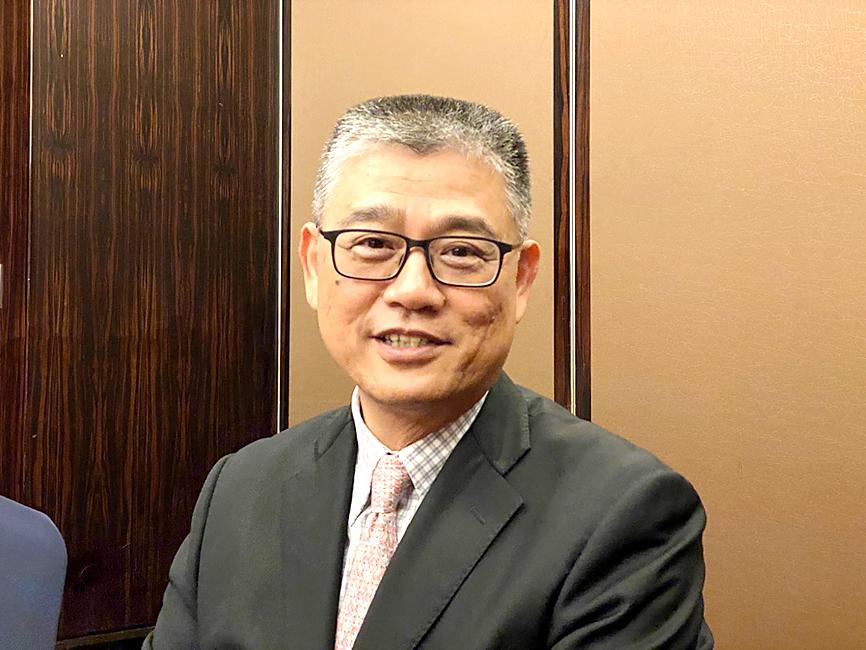Rugged PC vendor Getac Technology Corp (神基) yesterday forecast that its sales would increase “by double digits” this year, despite supply chain difficulties.
During the company’s online shareholders’ meeting, Getac chairman James Hwang (黃明漢) said that he is “pinning his hopes on the return of the US and Europe commercial market” for the second half of this year.
“The company is targeting 6 to 12 percent growth in revenue year-on-year in 2021,” Hwang said. “It’s tough, but doable.”

Photo: CNA
Getac, which was founded in 1989, produces rugged computers, mechanical components, aerospace fasteners and automotive components.
The rugged computers are designed for use in difficult environments such as in the military, medical and transportation sectors in which devices need to be water, dust and impact proof.
Hwang forecast increased demand for the company’s rugged computers as Europe and the US reopen for business.
“In the second quarter we are beginning to see more orders and an increase in demand from military and police users in Europe and the US,” Hwang said. “I remain upbeat about the second half of 2021.”
Hwang said that he expects rugged computer sales to grow by 8 to 10 percent for the whole of this year.
“Components shortage is still the wild card,” he said.
While demand for automotive components is being affected by the semiconductor shortage, Hwang said the company still hopes to reach double-digit percentage growth in sales in the segment this year.
“We have seen some delays in the orders, but demand is still there,” he said.
Hwang said that he expects sales of mechanical and electrical parts to remain mostly flat.
As raw material prices and logistical costs increase, Getac is in “rolling discussions” with customers about price increases, Hwang said, adding that most of the company’s customers are aware of the issues.
“Some products have to go up in price,” Hwang said. “After good communication with clients, they understand they must absorb some of the cost increases.”
Getac reported revenue of NT$2.27 billion (US$81.05 million) for last month, up 1.82 percent year-on-year.
Revenue in the first six months of the year was NT$14.91 billion, up 14.72 percent year-on-year.

TAKING STOCK: A Taiwanese cookware firm in Vietnam urged customers to assess inventory or place orders early so shipments can reach the US while tariffs are paused Taiwanese businesses in Vietnam are exploring alternatives after the White House imposed a 46 percent import duty on Vietnamese goods, following US President Donald Trump’s announcement of “reciprocal” tariffs on the US’ trading partners. Lo Shih-liang (羅世良), chairman of Brico Industry Co (裕茂工業), a Taiwanese company that manufactures cast iron cookware and stove components in Vietnam, said that more than 40 percent of his business was tied to the US market, describing the constant US policy shifts as an emotional roller coaster. “I work during the day and stay up all night watching the news. I’ve been following US news until 3am

UNCERTAINTY: Innolux activated a stringent supply chain management mechanism, as it did during the COVID-19 pandemic, to ensure optimal inventory levels for customers Flat-panel display makers AUO Corp (友達) and Innolux Corp (群創) yesterday said that about 12 to 20 percent of their display business is at risk of potential US tariffs and that they would relocate production or shipment destinations to mitigate the levies’ effects. US tariffs would have a direct impact of US$200 million on AUO’s revenue, company chairman Paul Peng (彭雙浪) told reporters on the sidelines of the Touch Taiwan trade show in Taipei yesterday. That would make up about 12 percent of the company’s overall revenue. To cope with the tariff uncertainty, AUO plans to allocate its production to manufacturing facilities in

Six years ago, LVMH’s billionaire CEO Bernard Arnault and US President Donald Trump cut the blue ribbon on a factory in rural Texas that would make designer handbags for Louis Vuitton, one of the world’s best-known luxury brands. However, since the high-profile opening, the factory has faced a host of problems limiting production, 11 former Louis Vuitton employees said. The site has consistently ranked among the worst-performing for Louis Vuitton globally, “significantly” underperforming other facilities, said three former Louis Vuitton workers and a senior industry source, who cited internal rankings shared with staff. The plant’s problems — which have not

COLLABORATION: Given Taiwan’s key position in global supply chains, the US firm is discussing strategies with local partners and clients to deal with global uncertainties Advanced Micro Devices Inc (AMD) yesterday said it is meeting with local ecosystem partners, including Taiwan Semiconductor Manufacturing Co (TSMC, 台積電), to discuss strategies, including long-term manufacturing, to navigate uncertainties such as US tariffs, as Taiwan occupies an important position in global supply chains. AMD chief executive officer Lisa Su (蘇姿丰) told reporters that Taiwan is an important part of the chip designer’s ecosystem and she is discussing with partners and customers in Taiwan to forge strong collaborations on different areas during this critical period. AMD has just become the first artificial-intelligence (AI) server chip customer of TSMC to utilize its advanced